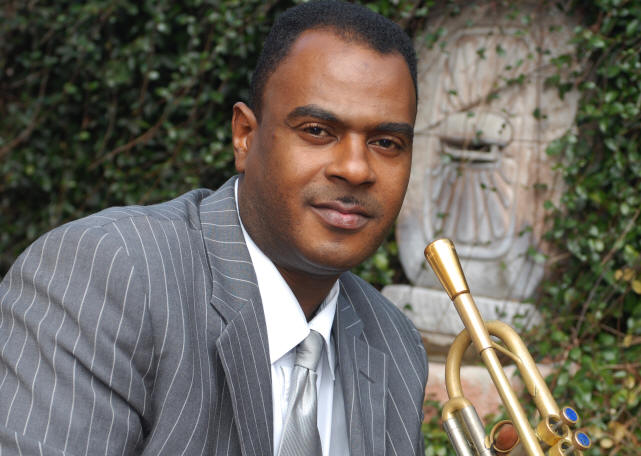Marlon Jordan, a New Orleans-born Trumpeter, was one of the “Young Jazz Lions”, who were signed, recorded, and promoted on major labels in the 1980s. From 1998 to 1992, he recorded three magnificent LPs for Columbia. For You Only was named by the Washington Post as “one of the greatest debut albums of the year”. Learson’s Return, The Undaunted and Learson’s Back, as well as one for Arabesque, Marlon’s Mod in 1997. Marlon is one of seven children born to Edward “Kidd”, a musician-educator, and Edvidge Jordan (a classical pianist). Marlon says that he started playing the saxophone and violin, but the trumpet is what stayed with him. Marlon recalls that his father took him to the bandstand, “even before I knew how to play.” He would introduce me to the musicians and call me up on stage. They’d say, ‘Come on. That’s Kidd’s son. Let him play.” He will play.” The Jordan family was a popular place for the young musicians to practice their music and learn from Kidd. Marlon graduated with honors from the NOCCA (New Orleans Center for the Creative Arts). Marlon is also a skilled classical musician and has performed solo with New Orleans Symphony Orchestra. His true joy is his performance in New Orleans’ streets and nightclubs. Marlon and his quintet took the album on the road after its release. As a headlining act, they joined Wynton Marsalis and Miles Davis in Atlanta, Dallas, and other cities. They played at some of the top jazz clubs in the country, including the Blue Note, the Ritz, and in concerts that ranged from New York’s Avery Fisher Hall, to Binghamton University. Marlon Jordan with Stephanie Jordan, You don’t know what love is, his latest album, announces the return to great trumpeter. This album also marks the debut of his sister Stephanie, a singer. It showcases an incredible musical family. The dancing and delicious music reveal a mature artist who sounds just like him. Jordan’s smooth, boppish vocals are laced with power and a deep knowledge of jazz trumpet history, all recorded in his own unique sonic signature. This session is inspired by the jazz albums Clifford Brown and Strings and Bird with Strings. This CD is unique because it features the Jordan family. Stephanie’s tone is a combination of Nancy Wilson’s sharp phrasing and diction with Shirley Horn’s economy. Edward “Kidd” Jordan (saxophonist), was a pioneer artist and educator. He is the patriarch. Marlon’s brother, Flutist Kent recorded many fine recordings on Columbia between 1984 and 1988. Rachel, a Peabody-trained violinist, was a member of the Louisiana Philharmonic Orchestra. She also taught music at Dillard University, the New Orleans Center for Creative Arts and is now an instructor at Jackson State University in Jackson, Mississippi. Marlon and Stephanie deliver classic swing tunes with a Crescent City rhythm section that includes drummer Troy Davis, bassist David Pulphus and pianist Darrell Lavigne. “My Favorite Things” is the first track. Marlon’s rich clarion sounds are beautifully countered by his father’s tense, “sheets and sound” solo. Marlon stated that he wanted to create a tune his father could sing and play. Coltrane is the man who made “My Favorite Things” so famous. My dad deals with [Coltrane] Live in Seattle and beyond. Uncle Alvin Batiste’s sharp clarinet accents the Miles Davis classic “All Blues.” Marlon proudly declared, “I opened for Miles,” and “I wanted people to know I can play in this vein.” Marlon’s Latin lilt in “Flamingo,” is a follow-up to Wynton’s recording. 4 and includes Jonathan Bloom, a cousin on the percussion. This exceptional group also includes Maynard Chatters (trombone player) and Mark Chatters (trumpeter). This recording can be summarized with an old saying: A family that swings together stays together. . . Blue Note Records released his and his siblings’ performance of Here’s to Life, which they performed live on televised during the Jazz at Lincoln Center Higher Ground Benefit Concert. Marlon and Stephanie went on a European Tour in support of the Higher Ground Relief initiative sponsored by the US Department. This was to express their gratitude to the countries of Bucharest and Germany for their assistance following Hurricane Katrina. Marlon turns to his music to find a sense of normalcy following nearly losing his life in Katrina. Marlon and his girlfriend were trapped on their roof for five days. A long-line helicopter rescue mission brought them to safety. He also saved two neighbours from a burning house by himself, breaking both his ankles along the way. Marlon Jordan is known as “The greatest trumpeter of his generation”. You can hear Jordan’s smooth, boppish lines, laced in power and an encyclopedic understanding of all aspects of jazz trumpet tradition, recorded in his unique sonic signature. from http://www.marlonjordan.com
